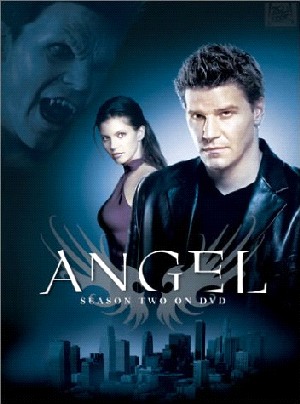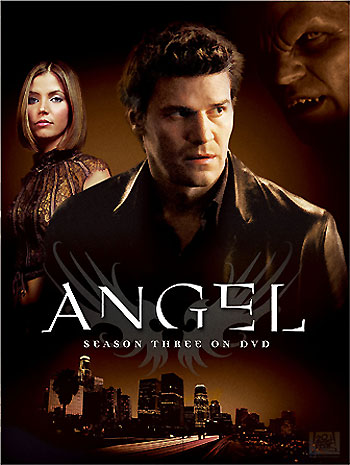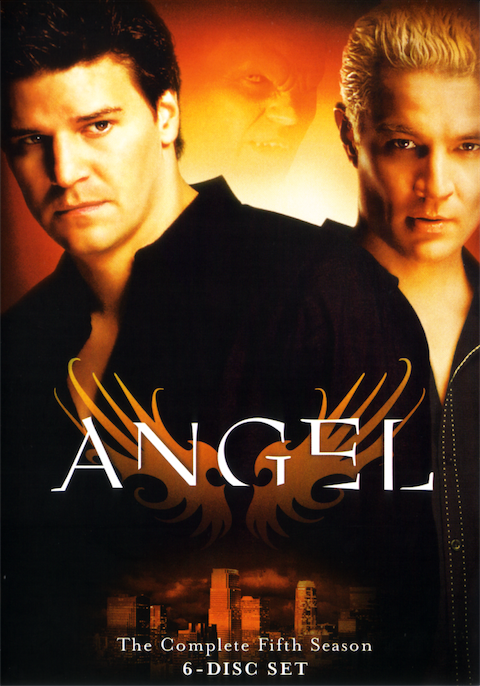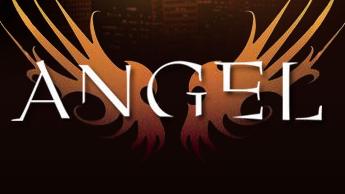This is part 2 of a three part series in which I’m taking a look back on all twelve seasons of Buffy the Vampire Slayer and its spinoff, Angel. In part 1, I went through all seven years of Buffy and talked about my favorite moments from each season. In this post, I’m going to be doing the same for Angel.
The more opinions I read from Buffy fans, the more it seems to me that Angel produces a bit of a divided reaction among them. I’ve talked to some who love the show and consider it to be better even than Buffy. Others, despite being big Buffy fans, don’t care for it much at all.
Personally, I’m somewhere in the middle. I love the show, though it isn’t as strong as Buffy and I can definitely see why some people don’t care for it. Its tone is much different; though, of course, there’s plenty of Joss Whedon’s characteristic witty dialogue and great writing present throughout all five seasons.
So, with that said, let’s dive into the show, starting with Angel, Season 1.
Angel – Season 1
 I know I just said that I love the show, and on the whole I do. But, I’ll be honest: I didn’t love it at first. In my opinion, the show gets off to a pretty rough start. It isn’t terrible; it is still a Joss Whedon show, after all, but it isn’t great either.
I know I just said that I love the show, and on the whole I do. But, I’ll be honest: I didn’t love it at first. In my opinion, the show gets off to a pretty rough start. It isn’t terrible; it is still a Joss Whedon show, after all, but it isn’t great either.
A big part of why I struggled to like the show was the characters. Angel initially brought two characters over from Buffy: Angel and Cordelia. Cordelia was fine on Buffy in a secondary role, but she doesn’t work great when she assumes a more prominent position. Her character does improve over the course of the show, but even in the later seasons Cordelia never quite works for me. There’s a shallowness to her that never entirely goes away and it keeps me from connecting with her character.
Then, there’s Angel himself. I know I’m going to get a lot of disagreement on this one, but I never cared that much for Angel when he was on Buffy. Unlike Cordelia, his character does develop very well in later seasons of Angel, but I really don’t care for him in season one.
Finally, there’s the third main character, Doyle. I know Doyle has a lot of fans, and frankly, I don’t get it. He’s not a bad character, but he’s fairly dull. I wasn’t one bit sad to see him make his departure after just nine episodes. In fact, I was relieved that he did. Compared to all the other colorful characters Whedon has created, Doyle stands out as being pretty bland.
The show improves once Wesley joins the cast. I’ll be talking about him more when I discuss the later seasons, but Wesley is hands down the best part of Angel. His transformation from who he’s introduced as in Buffy season three, to where he winds up at the end of Angel season five, is incredible. Seriously, his character arc is as good as anything you’ll ever see.
The season also adds Charles Gunn in the last few episodes. He’s a great character, but he doesn’t really start to develop until next year.
Outside of the characters, season one is still a bit hit and miss. They do a great job setting up Wolfram & Hart as a main villain but then proceed to do almost nothing with them for the majority of the season. Faith’s storyline is easily the best part of the season and proves to be a great continuation of her character arc from Buffy season three.
Rating: 3/5
Favorite Episode: Five by Five – The final scene with Angel and Faith is absolutely haunting. In a span of moments she goes from trying to kill Angel to begging him to kill her. He doesn’t. Instead he takes her in and cares for her. My issues with season one aside, that scene alone makes the whole year worthwhile. It’s one of the most profound illustrations of grace I’ve ever seen and possibly my favorite moment in the entire show.
Angel – Season 2
 Season two of Angel takes a huge step in the right direction. Bringing Darla back was a stroke of genius. The psychological war Wolfram & Hart wages on Angel through her is incredibly well done. In some ways, every season of Angel is about him being broken down and rebuilt. He falls and then claws his way back to find redemption. That theme is felt more powerfully in this season than anywhere else in the show.
Season two of Angel takes a huge step in the right direction. Bringing Darla back was a stroke of genius. The psychological war Wolfram & Hart wages on Angel through her is incredibly well done. In some ways, every season of Angel is about him being broken down and rebuilt. He falls and then claws his way back to find redemption. That theme is felt more powerfully in this season than anywhere else in the show.
The character work is great in this season as well. I mentioned my issues with Angel and Cordelia. While those don’t entirely go away, both characters improve a lot this year. Darla’s character arc, especially, is a highlight. Whedon does what he seems to do best by taking an evil character and making her somewhat sympathetic and quite complex.
We also meet Lorne for the first time. Lorne was never my favorite character, but he adds something to every episode he’s in. It annoys me a bit that he’s referred to only as “The Host” for so long. Since it’s very difficult to believe the characters don’t know his name, that choice comes across as lazy writing. Seriously, how hard is it to think up a name?
I really loved season two, that is, I loved it right up until the final story arc. At the end of the season we leave behind the brilliant storyline we’ve been following in favor of a four episode adventure in Pylea. Virtually nothing about this storyline works. I’m glad we get Fred out of it, but other than that, it’s a complete waste of time. The humor falls completely flat, Princess Cordelia is lame, Groosalugg is obnoxious (and remains so) and the entire adventure feels pointless. This storyline is the only thing Joss Whedon’s done that I absolutely hate.
It’s especially unfortunate that it takes place at the end of the season when the show ought to be at its strongest. In addition to all the other issues, it makes me feel like we missed out on an awesome season finale that should have been present in its place. Regardless of when it aired, the Pylea storyline is a disaster. It doesn’t cancel out how good everything else is this season, but it is a fairly significant blight on what the show accomplished in year two.
Rating: 4/5 (The Pylea storyline gets a 1/5)
Favorite Episode: Reunion – This episode was dark. Really, really dark. Its final moments feature some of the best stuff in the season, as Angel first locks Holland Manners and several other Wolfram & Hart associates in a room with Darla and Drusilla and then proceeds to fire everyone on his staff. It’s a powerful episode that underscores just how far Angel has fallen at this point in the season.
Angel – Season 3
 Like season two, season three is a great year with a few weak points mixed in; however, even with that similarity, it’s still a significant step forward from season two. Its strong points are as good or better, and it’s weak points don’t bring things down nearly as much as the Pylea storyline did in season two.
Like season two, season three is a great year with a few weak points mixed in; however, even with that similarity, it’s still a significant step forward from season two. Its strong points are as good or better, and it’s weak points don’t bring things down nearly as much as the Pylea storyline did in season two.
The season starts out great as the first episode introduces us to one of the show’s best villains, Daniel Holtz. Holtz is a vampire hunter who initially opposed Angel in the 19th century when Angel is still Angelus. Angelus becomes responsible for the murder of his family and spends years toying with and tormenting him. Holtz is everything a Joss Whedon villain should be. He’s complex and tormented. Although we’re cheering against him, it’s hard to say that he doesn’t have a point.
As a villain, Holtz reminds me a lot of Javert from Les Miserables. Both characters could be good men, but both fail to understand the reality of grace and the power of transformation. To me, that type of villain is quite terrifying because, as a Christian, I see how easy it would be to fall into the same trap. Were Holtz a Christian he’d be the sort of man who would get all of the doctrine right and yet fail to miss the entire point of the Gospel. His character ought to serve as a sobering warning to those of us in the church.
The first part of the seasons revolves around Darla’s pregnancy and Holtz hunting down her and Angel. It’s storytelling at its best, culminating in Darla sacrificing her own life for the sake of her child.
After Connor is born, the season takes a turn for the worst. It’s not that the storyline of Angel having a child is bad. It’s that the way it is portrayed on screen is fairly obnoxious in a couple of big ways. First, Angel spends several episodes doing little besides talking to Connor in a cutesy, baby-talk voice. Second, Connor spends the same several episodes doing little besides crying. As a parent of two young kids, I can verify that both of these things accurately show what it’s like to have a baby, but that doesn’t stop them from being annoying.
The last thing I need to see on a show like this is our dark, brooding hero spending scene after scene talking in baby talk. Ditto with having a baby cry nonstop. Just because it’s accurate doesn’t mean it needs to be shown on TV. I hear more than enough of kids crying in real life. I don’t need it on what’s supposed to be a dark show for adults.
Thankfully, Wesley does us all a favor and steals Connor from Angel. It’s here that the show really picks up its pace again. I love the dark turn that Wesley takes in kidnapping Connor. It’s a point of character development that continues to pay off over most of next season.
The season ends with a great storyline as Connor returns, Holtz takes his final revenge on Angel, Cordelia ascends and Connor betrays Angel.
Season three is a very strong year for the show. It starts and ends great. The middle of the year is pretty weak, but not enough to detract from everything else the season has to offer.
Rating: 4/5
Favorite Episode: Forgiving – The final scene in the hospital between Wesley and Angel is one of the greatest moments in the entire show. Angel first assures Wesley that he’s not Angelus. Then, as soon as Wesley acknowledges he understands, Angel smothers him yelling at him for stealing Connor. It’s a powerful moment and shows just how far both characters have come.
Angel – Season 4
 Up until season four, I always felt that Angel existed in Buffy’s shadow. Both shows were great, but the original far surpassed the spinoff. Watching both simultaneously on DVD, I found myself much more excited to watch a Buffy episode than I did an Angel episode.
Up until season four, I always felt that Angel existed in Buffy’s shadow. Both shows were great, but the original far surpassed the spinoff. Watching both simultaneously on DVD, I found myself much more excited to watch a Buffy episode than I did an Angel episode.
All of that changes with season four. Angel not only equals its respective Buffy season (season seven); it surpasses it. Part of that is due to Buffy declining slightly in its final year, but most of the credit goes to Angel finally having a strong season without any major, glaring weaknesses.
There was a lot of great stuff during this season. The show handled the return of Angelus perfectly. What could have easily felt like a repeat of Buffy season two is instead a very original take on Angelus taking control. The fact that Angel willingly allowed Angelus to be unleashed makes the storyline even more compelling. I would have preferred to have a bit more of Angelus in the season, especially since he’s behind bars for much of the narrative arc, but what’s there is very strong.
The emergence of Jasmine at the end of the season puts an interesting twist on earlier events, both in season four and in the show as a whole. We’re supposed to believe that Jasmine has largely been orchestrating things throughout the previous four seasons. I’d be curious to see how that revelation holds up when re-watching the show. Does that revelation hold up or is it a clever bit of retconning? I’d suspect a bit of both.
In any case, the storyline works very well and puts our heroes in the unique position of having to prevent world peace and the end of evil.
The final episode throws in one more twist where Angel and company are “rewarded” for their fight against Jasmine by being given control of the L.A. branch of Wolfram & Hart. Of course, the gift comes with plenty of strings attached, as will be shown in season five.
Rating: 4.5/5
Favorite Episode: Salvage – Of all the seasons of Buffy and Angel, this is the one in which it’s hardest for me to choose a favorite episode. The season as a whole is strong, but there’s no one episode that really stands out as being amazing (which is the main thing that keeps the season’s rating from being a perfect 5/5). That said, I love that they bring Faith back. The dynamic between her and Angel, though only part of a few episodes, is one of my favorite parts of the show. This episode, especially her loyalty to Angel, really underscores how much the character has grown.
Angel – Season 5
 If you’ve read through this article season by season, you’ve probably noticed a trend developing in which I like every season of Angel a little bit more than the previous one. I’m happy to say that season five is no exception. In its final year, Angel truly outdoes itself with a season that is not only the show’s personal best, but may, in fact, be the best season in the Buffyverse.
If you’ve read through this article season by season, you’ve probably noticed a trend developing in which I like every season of Angel a little bit more than the previous one. I’m happy to say that season five is no exception. In its final year, Angel truly outdoes itself with a season that is not only the show’s personal best, but may, in fact, be the best season in the Buffyverse.
Everything in this season works. The transition to Wolfram & Hart is done perfectly and brings with it all the moral dilemmas we would expect. Spike proves to be a great addition to the cast. I mention in my review of Buffy that his return in this season diminishes his sacrifice at the end of Buffy. I hold to that, but while that choice negatively impacts, having Spike on the show only helps Angel.
Another major character change was the emergence of Illyria and the destruction of Fred. It’s a tragic and powerful plot twist that really elevates the season. I can’t say enough good things about Amy Acker’s acting, either. It’s almost hard to believe it’s the same performer playing both characters. Through the inflection of her voice and subtle mannerisms, she brings Illyria to life in a way that’s completely distinct from Fred. With a lesser actress, the character might not have worked. Amy Acker sells the transformation brilliantly.
I’d be remiss if I didn’t mention the infamous puppet episode, “Smile Time.” This is yet another experimental episode from Joss Whedon that pays off brilliantly. If there’s one thing I wish had been done differently, it would be to have more characters than just Angel turned into puppets. That nitpick aside, “Smile Time” is one of the best episodes in a season filled with great ones.
At the center of the season is this question: what happens when you compromise in order to be able to do more good? It’s felt on a major level with the whole move to Wolfram & Hart, but it’s also felt in smaller things throughout the season, such as Gunn more or less selling his soul in order to become a world class lawyer.
Angel frequently explores grey areas and moral dilemmas similar to that, but they are never as pronounced as in season five. The result is a year that feels extremely substantive and weighty. Watching this season, you get drawn into the moral dilemma like never before. To me, that’s what made it so wonderful.
Rating: 5/5
Favorite Episode: Not Fade Away – The season and series finale is a powerful and misunderstood tour de force. After finishing the show, I browsed the internet looking at other opinions on the finale. It turns out that there are a lot of fans who were disappointed by the ending. I can kind of understand why: the show does end without any real resolution, but I also think those people are missing the point. The whole theme of the episode, and of the show as a whole, is that the battle against evil is ongoing. Our job isn’t to conquer evil once and for all, but to take a stand against it wherever and however we can. Rather than seeing the final scene as an unresolved cliffhanger, I see it as a bold final statement of that message. If you look at the finale that way, I think you’ll agree it’s one of the best finales a series has ever had.
Conclusion
It’s tough for me to sum up a show like Angel. It starts out good but flawed, slowly improves each year, until its astounding final season. It’s an uneven show at times, but its weaknesses never outweigh its strengths.
So, with that, I’ll wrap up my summary of all five seasons of Angel. Check back in the next several days for the final installment in my Buffy/Angel retrospective; where I’ll look at how the two shows compare to the rest of the Whedon canon.


GREAT article. I have to disagree about Lorne, though; I absolutely love him.